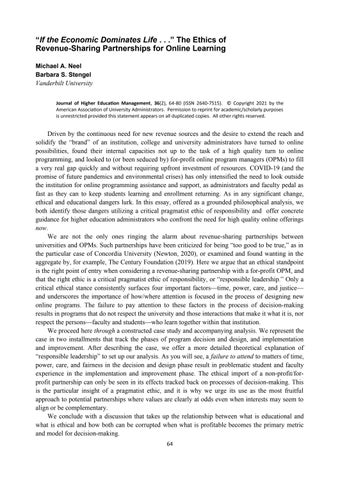“If the Economic Dominates Life . . .” The Ethics of Revenue-Sharing Partnerships for Online Learning Michael A. Neel Barbara S. Stengel
Vanderbilt University Journal of Higher Education Management, 36(2), 64-80 (ISSN 2640-7515). © Copyright 2021 by the American Association of University Administrators. Permission to reprint for academic/scholarly purposes is unrestricted provided this statement appears on all duplicated copies. All other rights reserved.
Driven by the continuous need for new revenue sources and the desire to extend the reach and solidify the “brand” of an institution, college and university administrators have turned to online possibilities, found their internal capacities not up to the task of a high quality turn to online programming, and looked to (or been seduced by) for-profit online program managers (OPMs) to fill a very real gap quickly and without requiring upfront investment of resources. COVID-19 (and the promise of future pandemics and environmental crises) has only intensified the need to look outside the institution for online programming assistance and support, as administrators and faculty pedal as fast as they can to keep students learning and enrollment returning. As in any significant change, ethical and educational dangers lurk. In this essay, offered as a grounded philosophical analysis, we both identify those dangers utilizing a critical pragmatist ethic of responsibility and offer concrete guidance for higher education administrators who confront the need for high quality online offerings now. We are not the only ones ringing the alarm about revenue-sharing partnerships between universities and OPMs. Such partnerships have been criticized for being “too good to be true,” as in the particular case of Concordia University (Newton, 2020), or examined and found wanting in the aggregate by, for example, The Century Foundation (2019). Here we argue that an ethical standpoint is the right point of entry when considering a revenue-sharing partnership with a for-profit OPM, and that the right ethic is a critical pragmatist ethic of responsibility, or “responsible leadership.” Only a critical ethical stance consistently surfaces four important factors—time, power, care, and justice— and underscores the importance of how/where attention is focused in the process of designing new online programs. The failure to pay attention to these factors in the process of decision-making results in programs that do not respect the university and those interactions that make it what it is, nor respect the persons—faculty and students—who learn together within that institution. We proceed here through a constructed case study and accompanying analysis. We represent the case in two installments that track the phases of program decision and design, and implementation and improvement. After describing the case, we offer a more detailed theoretical explanation of “responsible leadership” to set up our analysis. As you will see, a failure to attend to matters of time, power, care, and fairness in the decision and design phase result in problematic student and faculty experience in the implementation and improvement phase. The ethical import of a non-profit/forprofit partnership can only be seen in its effects tracked back on processes of decision-making. This is the particular insight of a pragmatist ethic, and it is why we urge its use as the most fruitful approach to potential partnerships where values are clearly at odds even when interests may seem to align or be complementary. We conclude with a discussion that takes up the relationship between what is educational and what is ethical and how both can be corrupted when what is profitable becomes the primary metric and model for decision-making. 64




